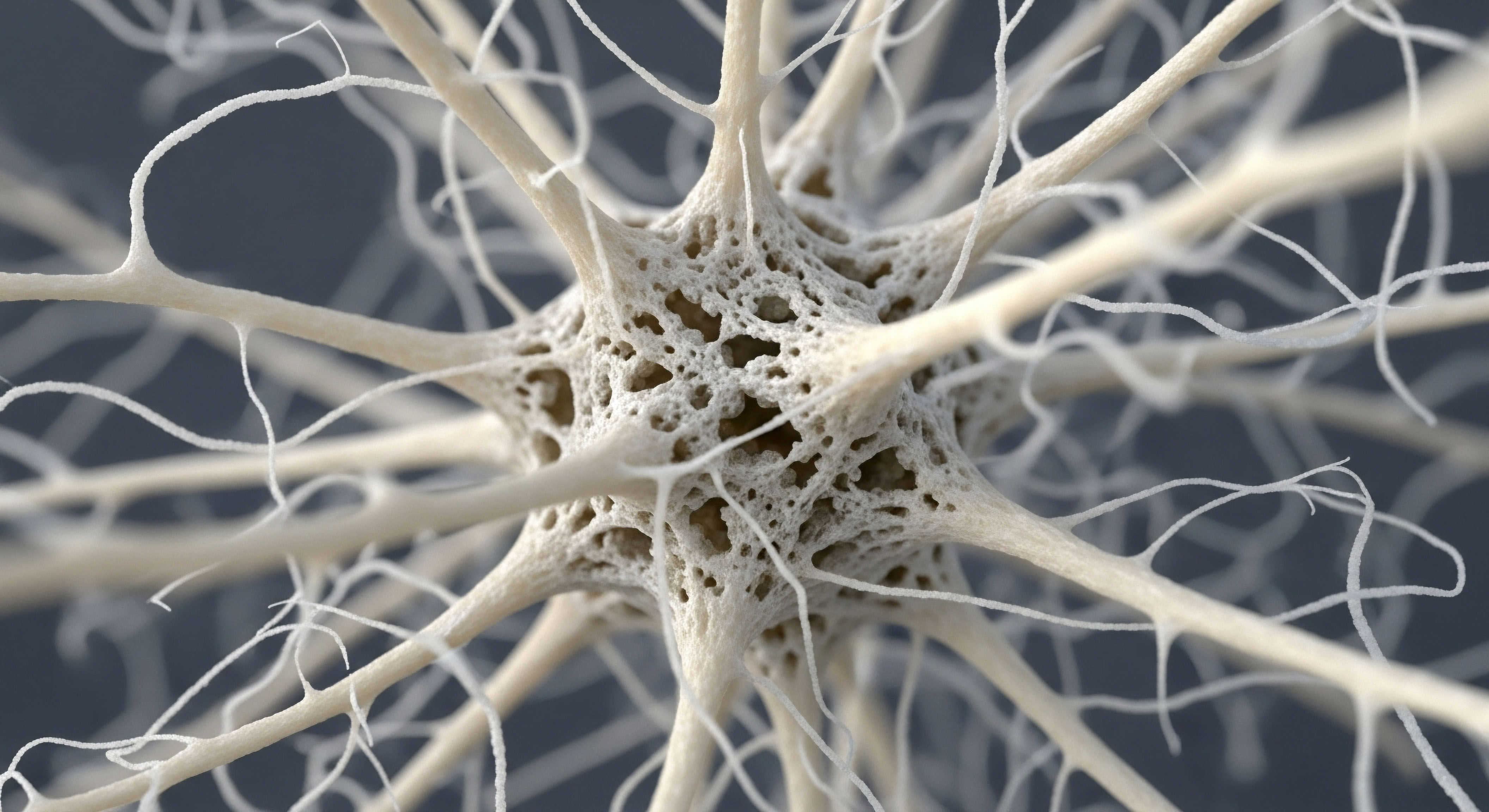

Fundamentals
Have you ever found yourself searching for a word that feels just beyond your grasp, or walked into a room only to forget why you entered? Perhaps you have noticed a subtle shift in your mental sharpness, a slight dimming of the clarity that once felt effortless.
These experiences, often dismissed as mere signs of aging or everyday stress, can feel disorienting and isolating. They are not simply minor inconveniences; they are signals from your body, often pointing to deeper physiological changes. Understanding these signals, particularly how hormonal fluctuations influence your cognitive landscape, represents a powerful step toward reclaiming your mental vitality.
Your body operates as an intricate network of communication, with hormones serving as essential messengers. These biochemical signals, produced by various glands, travel through your bloodstream, influencing nearly every cell and system. They orchestrate processes from growth and metabolism to mood regulation and, critically, brain function.
When these messengers are in balance, your systems operate with seamless coordination. When their levels fluctuate or decline, the ripple effects can be felt across your entire being, including your capacity for clear thought and memory.
The endocrine system, a collection of glands that produce and secrete hormones, acts as a sophisticated internal messaging service. It includes the adrenal glands, thyroid gland, pituitary gland, and the gonads ∞ testes in men and ovaries in women. Each of these components contributes to a delicate equilibrium, and a disruption in one area can influence others.
The brain itself is not merely a recipient of these hormonal messages; it also produces its own neurosteroids, which play direct roles in neural activity and cognitive processes. This reciprocal relationship highlights the profound interconnectedness of your hormonal health and your mental acuity.
Hormonal balance is essential for optimal brain function, influencing memory, focus, and overall mental clarity.
Consider the dynamic interplay of these chemical regulators. For instance, sex hormones, such as estrogen and testosterone, are not solely responsible for reproductive functions. They exert significant influence on brain regions associated with learning, memory, and emotional regulation. Estrogen receptors are present in areas like the hippocampus and cerebral cortex, which are vital for memory consolidation and cognitive processing.
Testosterone also affects cognitive domains, including spatial abilities and verbal fluency. When the production of these hormones begins to wane, as occurs naturally with aging or due to other physiological factors, the brain’s environment changes, potentially affecting its operational efficiency.
The concept of feedback loops helps explain how hormonal systems maintain equilibrium. Imagine a thermostat in your home ∞ when the temperature drops below a set point, the furnace activates to raise it. Once the desired temperature is reached, the furnace turns off.
Similarly, your endocrine glands release hormones, and when levels reach a certain threshold, signals are sent back to the originating glands or the brain to reduce further production. This constant adjustment ensures that hormone levels remain within a healthy range. Disruptions to these feedback mechanisms can lead to sustained imbalances, contributing to symptoms like brain fog, reduced concentration, or memory lapses.
Understanding these foundational concepts provides a framework for recognizing how your personal experiences of cognitive shifts are deeply rooted in your biological systems. It moves beyond simply acknowledging symptoms to exploring the underlying mechanisms, offering a path toward informed action and restored vitality. Your journey toward mental clarity begins with appreciating the profound influence of your internal chemistry.


Intermediate
When the delicate balance of your internal chemistry falters, specific, clinically informed strategies can help recalibrate your systems. Personalized wellness protocols, particularly those involving hormonal optimization, aim to restore physiological equilibrium, thereby supporting cognitive function. These interventions are not about forcing the body into an unnatural state; they are about assisting it in returning to a more functional, youthful operating capacity. The approach involves a precise understanding of how therapeutic agents interact with your biological pathways.
For men experiencing symptoms of declining testosterone, often referred to as andropause or late-onset hypogonadism, Testosterone Replacement Therapy (TRT) can be a transformative intervention. This protocol aims to restore testosterone levels to a healthy physiological range, which can positively influence various aspects of well-being, including mental sharpness. A standard approach involves weekly intramuscular injections of Testosterone Cypionate, typically at a concentration of 200mg/ml. This method provides a steady release of the hormone, avoiding sharp peaks and troughs.
To ensure a comprehensive and balanced approach, TRT protocols often include additional medications. Gonadorelin, administered via subcutaneous injections twice weekly, helps maintain the body’s natural testosterone production and supports testicular function, which is particularly relevant for preserving fertility. Without this support, exogenous testosterone can suppress the body’s own production.
Another important component is Anastrozole, an oral tablet taken twice weekly. This medication acts as an aromatase inhibitor, preventing the excessive conversion of testosterone into estrogen. Managing estrogen levels is vital because elevated estrogen in men can lead to undesirable side effects and may counteract some of the cognitive benefits of testosterone optimization.
In some cases, Enclomiphene may also be included to further support the pituitary gland’s release of luteinizing hormone (LH) and follicle-stimulating hormone (FSH), which are critical for endogenous hormone synthesis.
Targeted hormonal optimization protocols can restore physiological balance, supporting cognitive clarity and overall well-being.
Women also experience significant hormonal shifts that affect cognitive function, particularly during peri-menopause and post-menopause. Declining levels of estrogen and progesterone can contribute to symptoms often described as “brain fog,” including memory lapses, difficulty concentrating, and slower mental processing. Testosterone also plays a role in female cognitive health, supporting mental sharpness and motivation.
For women, hormonal optimization protocols are carefully tailored. Testosterone Cypionate is typically administered in much lower doses, often 10 ∞ 20 units (0.1 ∞ 0.2ml) weekly via subcutaneous injection. This micro-dosing aims to bring female testosterone levels into a healthy pre-menopausal range, supporting libido, mood, and cognitive vitality.
Progesterone is prescribed based on menopausal status, often to balance estrogen and provide its calming effects on the brain, influencing GABA receptors that promote clear-headedness and sleep. Some women may opt for Pellet Therapy, which involves long-acting testosterone pellets inserted subcutaneously, offering sustained hormone release. Anastrozole may be used in conjunction with pellet therapy when appropriate to manage estrogen conversion.
Beyond sex hormones, other biochemical messengers, known as peptides, offer targeted support for cognitive health and overall vitality. These short chains of amino acids act as signaling molecules, influencing various biological processes. Growth Hormone Peptide Therapy, for instance, utilizes specific peptides to stimulate the body’s natural production of growth hormone. This can have far-reaching benefits, including improved sleep quality, enhanced muscle gain, reduced body fat, and anti-aging effects that extend to cognitive function.
Key peptides in this category include Sermorelin, Ipamorelin / CJC-1295, Tesamorelin, Hexarelin, and MK-677. These agents work by stimulating the pituitary gland to release growth hormone, which in turn increases levels of Insulin-like Growth Factor-1 (IGF-1). IGF-1 has direct neuroprotective effects and supports neurogenesis, the formation of new neurons, particularly in brain regions associated with memory and learning. This can translate to improved mental alertness, memory, and overall cognitive performance.
Other targeted peptides address specific aspects of well-being, indirectly supporting cognitive health by improving overall systemic function. PT-141, for example, is utilized for sexual health, addressing issues that can significantly impact mental state and focus. Pentadeca Arginate (PDA) is applied for tissue repair, healing processes, and inflammation modulation. Reducing systemic inflammation and supporting cellular repair mechanisms throughout the body can have a beneficial ripple effect on brain health, as chronic inflammation is a known contributor to cognitive decline.
The following table summarizes some common hormonal and peptide protocols and their primary cognitive benefits:
| Protocol | Primary Hormones/Peptides | Cognitive Benefits |
|---|---|---|
| Testosterone Optimization (Men) | Testosterone Cypionate, Gonadorelin, Anastrozole | Improved spatial ability, verbal memory, executive function, mood, mental energy. |
| Hormone Balance (Women) | Testosterone Cypionate, Progesterone, Estrogen (if HRT) | Reduced brain fog, enhanced verbal memory, processing speed, mental sharpness, emotional stability. |
| Growth Hormone Peptide Therapy | Sermorelin, Ipamorelin / CJC-1295, Tesamorelin, Hexarelin, MK-677 | Enhanced memory, mental alertness, motivation, neuroprotection, improved sleep. |
| Targeted Peptides | PT-141, Pentadeca Arginate (PDA) | Indirect cognitive support through improved sexual health, reduced inflammation, and tissue repair. |
For men who have discontinued TRT or are trying to conceive, a specific Post-TRT or Fertility-Stimulating Protocol is implemented. This protocol aims to restore natural testicular function and sperm production. It typically includes a combination of Gonadorelin, Tamoxifen, and Clomid.
Gonadorelin stimulates the pituitary, while Tamoxifen and Clomid, as selective estrogen receptor modulators (SERMs), block estrogen’s negative feedback on the pituitary, thereby increasing LH and FSH release. This encourages the testes to resume testosterone and sperm production. Anastrozole may be optionally included to manage estrogen levels during this phase. This careful recalibration ensures a smooth transition and supports the body’s inherent capacity for balance.
The administration methods for these therapies are chosen for optimal absorption and effect. Intramuscular or subcutaneous injections allow for direct entry into the bloodstream, bypassing digestive processes that could degrade the compounds. Oral tablets are used for specific agents like Anastrozole, where systemic absorption is desired. Pellet therapy offers a convenient, long-term delivery system, reducing the frequency of administration. Each method is selected with precision to ensure the body receives the necessary biochemical support to restore its functional harmony.


Academic
The intricate relationship between hormonal systems and cognitive function extends far beyond simple correlations, delving into the very architecture and metabolic machinery of the brain. To truly grasp how hormonal changes influence cognitive function over time, one must consider the sophisticated interplay of neuroendocrine axes, cellular energy dynamics, and neurotransmitter modulation. This systems-biology perspective reveals that cognitive decline is not merely a consequence of aging, but often a manifestation of cumulative dysregulation within these interconnected biological pathways.
A central orchestrator of hormonal balance is the Hypothalamic-Pituitary-Gonadal (HPG) axis. This complex feedback system involves the hypothalamus, which releases gonadotropin-releasing hormone (GnRH); the pituitary gland, which responds by secreting luteinizing hormone (LH) and follicle-stimulating hormone (FSH); and the gonads, which produce sex steroids like testosterone and estrogen.
Disruptions within this axis, whether due to aging, stress, or environmental factors, can profoundly impact brain health. For instance, age-related declines in sex steroids lead to compensatory increases in LH and FSH. Elevated levels of these gonadotropins have been correlated with decreased cognitive performance in both men and women, and are observed in conditions like Alzheimer’s disease. This suggests that the brain’s exposure to an altered hormonal milieu, not just the absence of sex steroids, contributes to cognitive vulnerability.
Beyond the HPG axis, the brain’s own capacity to synthesize neurosteroids represents a critical, yet often overlooked, dimension of cognitive regulation. Neurosteroids, such as allopregnanolone and dehydroepiandrosterone (DHEA), are synthesized directly within the central nervous system from cholesterol or peripheral steroid precursors.
These molecules exert rapid, non-genomic effects by directly modulating neurotransmitter receptors and ion channels, particularly the GABA-A receptors and NMDA receptors. GABA-A receptors mediate inhibitory neurotransmission, promoting neural calm and stability, while NMDA receptors are crucial for synaptic plasticity, a fundamental process underlying learning and memory.
When neurosteroid levels decline, as they often do with aging or chronic stress, the delicate balance of neural excitability can be disturbed. A reduction in allopregnanolone, for example, can diminish GABAergic tone, potentially leading to increased neural excitability and impaired cognitive processing.
Conversely, interventions that support neurosteroid synthesis or mimic their actions can have neuroprotective effects, enhancing learning and memory. This highlights a sophisticated mechanism by which the brain self-regulates its cognitive capacity, independent of, yet influenced by, circulating peripheral hormones.
Cognitive decline often stems from dysregulation within neuroendocrine axes, impacting brain energy and neurotransmitter systems.
The brain is an exceptionally metabolically active organ, relying on a constant and efficient supply of energy. Brain energy metabolism is a dynamic network involving neurons, astrocytes, and the cerebral vasculature. Astrocytes, a type of glial cell, play a critical intermediary role in coupling neuronal activity with local cerebral blood flow and nutrient supply. They regulate glucose transport, lactate production, and neurotransmitter recycling, all of which are vital for sustained cognitive function.
Hormonal changes directly influence this metabolic landscape. Estrogen, for instance, modulates brain glucose metabolism, mitochondrial function, and myelin integrity. The decline in estrogen during menopause can lead to reduced brain glucose utilization, increased insulin resistance within brain cells, and mitochondrial insufficiency. This metabolic shift renders the brain more vulnerable to oxidative stress and inflammation, pathways implicated in neurodegenerative conditions. Similarly, testosterone influences brain energy pathways, and its decline can affect neuronal resilience.
Consider the profound impact of metabolic health on cognitive longevity. Conditions like insulin resistance and chronic inflammation, often driven by lifestyle factors and influenced by hormonal status, create a hostile environment for neuronal health. This systemic metabolic dysregulation can impair neurovascular coupling, the process by which blood flow is precisely matched to neuronal activity, further compromising brain function.
The following table provides a deeper look into the mechanisms by which key hormones and neurosteroids influence cognitive function at a cellular and systemic level:
| Hormone/Neurosteroid | Primary Source | Key Mechanisms of Cognitive Influence | Impact on Cognitive Domains |
|---|---|---|---|
| Estrogen | Ovaries, Brain (neurosteroidogenesis) | Modulates glucose metabolism, enhances synaptic plasticity, supports neurogenesis, anti-inflammatory, antioxidant. Acts on estrogen receptors (ERα, ERβ) in hippocampus, cortex. | Verbal memory, processing speed, executive function, mood regulation. |
| Testosterone | Testes, Adrenals, Ovaries, Brain (neurosteroidogenesis) | Influences neuronal survival, myelination, neurotransmitter systems (dopamine, acetylcholine), supports cerebral blood flow. Acts on androgen receptors. | Spatial ability, verbal fluency, attention, motivation, executive function. |
| Progesterone | Ovaries, Adrenals, Brain (neurosteroidogenesis) | Precursor to allopregnanolone, modulates GABA-A receptors, neuroprotective, anti-inflammatory, supports myelin repair. | Sedation, anxiety reduction, visual memory, sleep regulation, clear-headedness. |
| Allopregnanolone | Brain (de novo synthesis) | Potent positive allosteric modulator of GABA-A receptors, reducing neuronal excitability, promoting neurogenesis and synaptogenesis. | Memory consolidation, mood stability, stress resilience, anxiety reduction. |
| Dehydroepiandrosterone (DHEA) | Adrenals, Brain (de novo synthesis) | Modulates NMDA receptors, anti-inflammatory, antioxidant, neurotrophic effects, supports synaptic plasticity. | Memory, learning, mood, overall cognitive vitality. |
How do hormonal fluctuations affect neural plasticity and brain network connectivity?
The brain’s ability to adapt and reorganize itself, known as neural plasticity, is profoundly influenced by hormonal signaling. Synaptic plasticity, the strengthening or weakening of connections between neurons, is a fundamental process for learning and memory. Sex hormones, in particular, regulate the density of dendritic spines, which are small protrusions on neurons that receive synaptic inputs.
Estrogen, for example, can increase dendritic spine density in the hippocampus, thereby enhancing synaptic connections and improving memory formation. A decline in estrogen can lead to reduced spine density and impaired synaptic function, contributing to cognitive changes.
Moreover, hormones influence the expression of neurotrophic factors, proteins that support the survival, growth, and differentiation of neurons. Brain-Derived Neurotrophic Factor (BDNF) is a key neurotrophin involved in learning, memory, and mood regulation. Testosterone and estrogen can both upregulate BDNF expression, promoting neuronal health and plasticity.
Growth hormone and its mediator, IGF-1, also play significant roles in neurogenesis and neuroprotection, particularly in the hippocampus, a region critical for memory. When these hormonal signals diminish, the brain’s capacity for repair, adaptation, and new learning can be compromised.
The interconnectedness of these systems means that a holistic approach to cognitive health must consider the broader physiological context. Addressing hormonal imbalances through targeted protocols, supporting metabolic health through nutrition and lifestyle, and mitigating chronic inflammation are not isolated interventions. They are synergistic strategies that collectively optimize the brain’s environment, allowing it to function with greater resilience and clarity over time. This integrated perspective offers a more complete understanding of the complex factors that shape your cognitive journey.
Hormones regulate neural plasticity and neurotrophic factor expression, directly impacting the brain’s capacity for learning and memory.
The impact of hormonal changes on neurotransmitter systems is another critical area of investigation. Neurotransmitters are the chemical messengers that transmit signals across synapses between neurons. Hormones can modulate the synthesis, release, and receptor sensitivity of various neurotransmitters, including acetylcholine, dopamine, serotonin, and norepinephrine.
Acetylcholine, for instance, is vital for memory and attention, and its levels can be influenced by estrogen. Dopamine is central to motivation, reward, and executive function, and both testosterone and growth hormone peptides can affect dopaminergic pathways.
Dysregulation in these neurotransmitter systems, often secondary to hormonal shifts, can manifest as cognitive symptoms. For example, reduced dopaminergic activity might contribute to decreased motivation or slower processing speed. Similarly, imbalances in serotonin can affect mood and memory. The brain’s sensitivity to these hormonal modulations underscores the profound influence of the endocrine system on the very fabric of thought and feeling.
Understanding these deep biological mechanisms provides a powerful framework for personalized wellness. It moves beyond a superficial understanding of symptoms to a detailed appreciation of the underlying cellular and systemic processes. This knowledge empowers individuals to engage with their health journey from a position of informed agency, recognizing that optimizing hormonal and metabolic health is a direct pathway to reclaiming cognitive vitality and functional capacity.

References
- Beauchet, Olivier, et al. “Testosterone and cognitive function ∞ current clinical evidence of a relationship.” European Journal of Endocrinology, vol. 155, no. 5, 2006, pp. 773-781.
- Brinton, Roberta Diaz. “Estrogen and memory ∞ basic mechanisms and clinical implications.” Molecular and Cellular Endocrinology, vol. 248, no. 1-2, 2006, pp. 107-113.
- Cherrier, Michael M. et al. “Testosterone replacement therapy improves spatial memory in men with mild cognitive impairment and Alzheimer’s disease.” Journal of Clinical Endocrinology & Metabolism, vol. 90, no. 5, 2005, pp. 2660-2668.
- Genazzani, Andrea R. et al. “Neurosteroids ∞ endogenous role in the human brain and therapeutic potentials.” Psychoneuroendocrinology, vol. 28, no. 2, 2003, pp. 1-18.
- Maki, Pauline M. and Susan M. Resnick. “Neuroimaging of estrogen effects on brain structure and function in women.” Dialogues in Clinical Neuroscience, vol. 14, no. 2, 2012, pp. 155-162.
- Müller, Michael, et al. “Endogenous sex hormone levels and cognitive function in aging men ∞ is there an optimal level?” Neurology, vol. 64, no. 5, 2005, pp. 866-871.
- Pardridge, William M. “Peptide drug delivery to the brain.” Journal of Clinical Investigation, vol. 122, no. 5, 2012, pp. 1599-1605.
- Reddy, P. Hemachandra, and Maheedhar Reddy K. “Metabolic pathways toward and away from a metabolic cliff during brain aging.” Frontiers in Aging Neuroscience, vol. 17, 2025, pp. 1-12.
- Sunderland, T. et al. “Dehydroepiandrosterone and dehydroepiandrosterone sulfate in Alzheimer’s disease ∞ a preliminary report.” Biological Psychiatry, vol. 26, no. 8, 1989, pp. 829-835.
- Vance, Mary Lee, et al. “Growth hormone and growth hormone-releasing peptide-6 increase brain insulin-like growth factor-I expression and activate intracellular signaling pathways involved in neuroprotection.” Endocrinology, vol. 145, no. 5, 2004, pp. 2426-2434.

Reflection
As you consider the intricate web of hormonal influences on your cognitive function, perhaps a new perspective on your own experiences begins to form. The fleeting moments of mental fogginess or the persistent sense of a mind less sharp are not merely random occurrences.
They are often echoes of deeper biological conversations happening within you, signals from a system striving for balance. This understanding is not meant to create anxiety, but rather to serve as a beacon, guiding you toward a more informed and proactive engagement with your health.
The journey toward reclaiming vitality is deeply personal. It requires listening to your body’s unique language, understanding its biochemical needs, and seeking guidance that respects your individual physiology. The knowledge shared here is a starting point, a foundation upon which you can build a more complete picture of your well-being. It underscores that optimal cognitive function is not a static state, but a dynamic interplay of many factors, with hormonal health playing a central role.
Your path to sustained mental clarity and overall functional capacity is a collaborative one. It involves partnering with clinical experts who can translate complex lab results into actionable strategies, tailoring protocols to your specific needs. This commitment to understanding your own biological systems is the most empowering step you can take. It is a commitment to living with full mental presence, without compromise.



